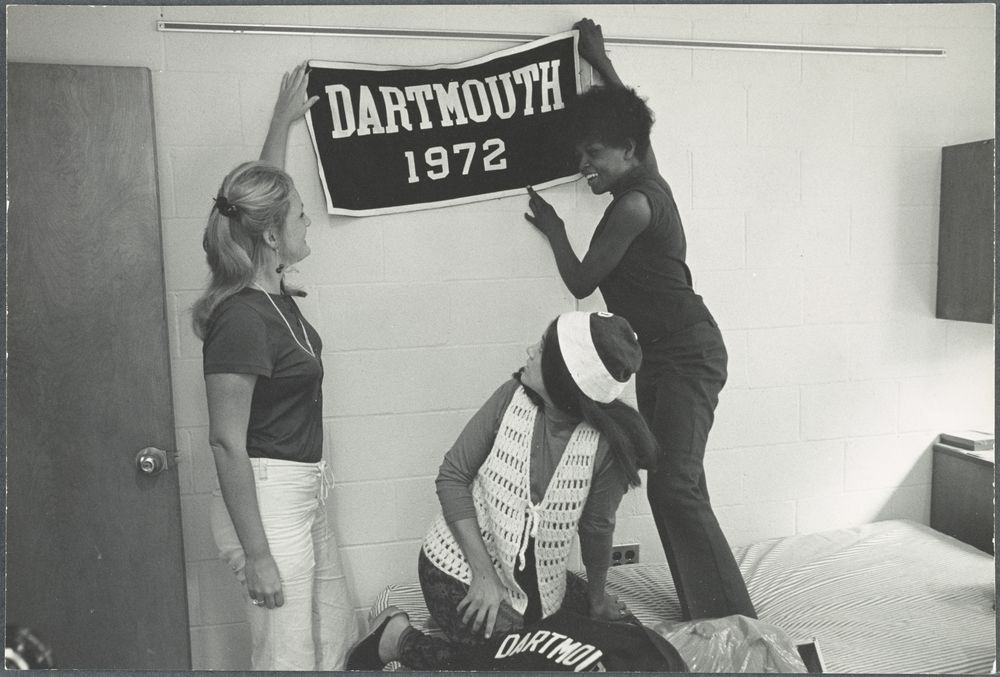It's an anniversary trifecta.
Fifty years ago, Dartmouth opened its doors of admission to women, established the Native American Studies program, and saw the founding of the Black Alumni at Dartmouth Association (BADA). Throughout 2022, the College will commemorate all three milestones, beginning with the shift to coeducation.
Women Blaze a Trail
At 6:30 p.m., November 21, 1971, on WDCR, Dartmouth College Radio, President John Kemeny made a stunning announcement. The Board of Trustees had voted to invite women to apply for four year matriculation, setting target enrollments at 3,000 men and 1,000 women undergraduates.
Following their meeting, the Board issued an explanatory statement.
"The historic purpose of Dartmouth College has been to train leaders for society. It is clear that women now will be playing an increasing role of leadership in our society and that Dartmouth can, and should, contribute to their education, making it possible for them to become, as Dartmouth men have through two centuries, outstanding doctors, lawyers, business leaders, scientists, and leaders in government."
Leaders they became, throughout the United States, around the world, and, of course, at their alma mater. From Ann Fritz Hackett ’76, the first alumna to serve on the Board of Trustees, to the more than two dozen others to follow in her footsteps, female board members have been a formidable force, both at Dartmouth and in their chosen professions.
Let the Commemoration Begin
At noon on November 9, Dartmouth will launch a yearlong observation of a half-century of coeducation with a virtual roundtable conversation featuring three influential women who have chaired the Board of Trustees. Susan Dentzer ’77, a senior policy fellow for the Robert J. Margolis Center for Health Policy at Duke University who led the board from 2001—2004, will moderate a conversation by two panelists: Laurel Richie ’81, a marketing professional and former president of the Women's National Basketball Association who just completed a nine-year tenure on Dartmouth's board, serving as chair from 2017 to 2021; and the current board chair, Liz Lempres ’83 Th ’84, a senior partner emeritus at McKinsey and Company.
Dentzer says the decision to hold the event online rather than on campus was made in the interest of safety as the pandemic lingers, and also allows for wider participation across the globe.
"We're marking the moment with an important conversation, but it's by no means the definitive conversation," says Dentzer. "Our experience as board chairs just scrapes the surface of what the years of coeducation have meant to all the women—and men—of Dartmouth. What we're doing is opening the door for the entire College community to spend the next year thinking about the role of coeducation: how far we have come and how much remains undone in terms of gender relations and other aspects of life both on campus and beyond Hanover."
The panel will kick off a year filled with opportunities to reflect on both the past and future, says Jennifer Avellino ’89, volunteer chair of the anniversary committee. A former senior producer at CNN and past president of the Dartmouth Alumni Council, Avellino can still recall in sharp detail how her three-year stint as news director for WDCR/WFRD, Dartmouth Broadcasting, sparked a long and rewarding career in journalism.
"The FM station was established in the 1970’s and was part of our news and music programming," says Avellino. "History was unfolding all around us, right there. I covered the New Hampshire primary, and got really hooked, reporting on politics."
For Avellino, a self-described history buff, the 2021—22 commemoration of coeducation comes at a pivotal moment.
"This may be the last big anniversary where we have women involved who remember that turning point, in 1972" she says. "For the next generation, we need to honor their pioneering accomplishments."
More Big Birthdays on the Horizon
Planning is also underway for two other significant anniversaries.
In 2022, there will be a rededication of the Native American Studies program (now the Department of Native American and Indigenous Studies), and the Black Alumni of Dartmouth Association will celebrate its 50-year anniversary.
Trailblazers who were underrepresented during much of Dartmouth's history have recently been honored by 10 new scholarships, made possible by a $10 million gift from an anonymous donor.
The gift will create two scholarships annually over five years, each named for a member of the Dartmouth community who paved the way for others. The 10 scholarships will support approximately 10 undergraduates each year.
This year, one scholarship is named for Daniel Simon, Class of 1777, the first Native American to earn a degree from Dartmouth. Another honors Trustee Emerita Richie, the first Black American to chair the Board of Trustees.
In announcing the gift, President Philip J. Hanlon ’77 said, "We know the individuals who will be honored by these gifts have changed Dartmouth for the better."
Cheryl Bascomb ’82, vice president for alumni relations, says she's seen and applauded those changes in the three decades she's been closely involved with the College.
"Dartmouth allowed me to step forward in ways that were safe," Bascomb says. "To try rebellion. To try leadership. To try establishing bonds with both women and men in different ways, and to move forward in my life with those experiences as a guide. This year, as we gather in so many ways to celebrate a half-century of growth and transition, I'm encouraged by how far we have come, and by the even more inclusive future we are all building together."
Bascomb's team in alumni relations and several volunteer alumni working groups are busily planning for the year ahead, and urging other members of the Dartmouth community to mark, in their own ways, all three important points in College history.
The Nov. 9 event on Zoom, which will open with a short video commemorating Dartmouth's shift to coeducation, is open to the entire Dartmouth community, and registration is required.

